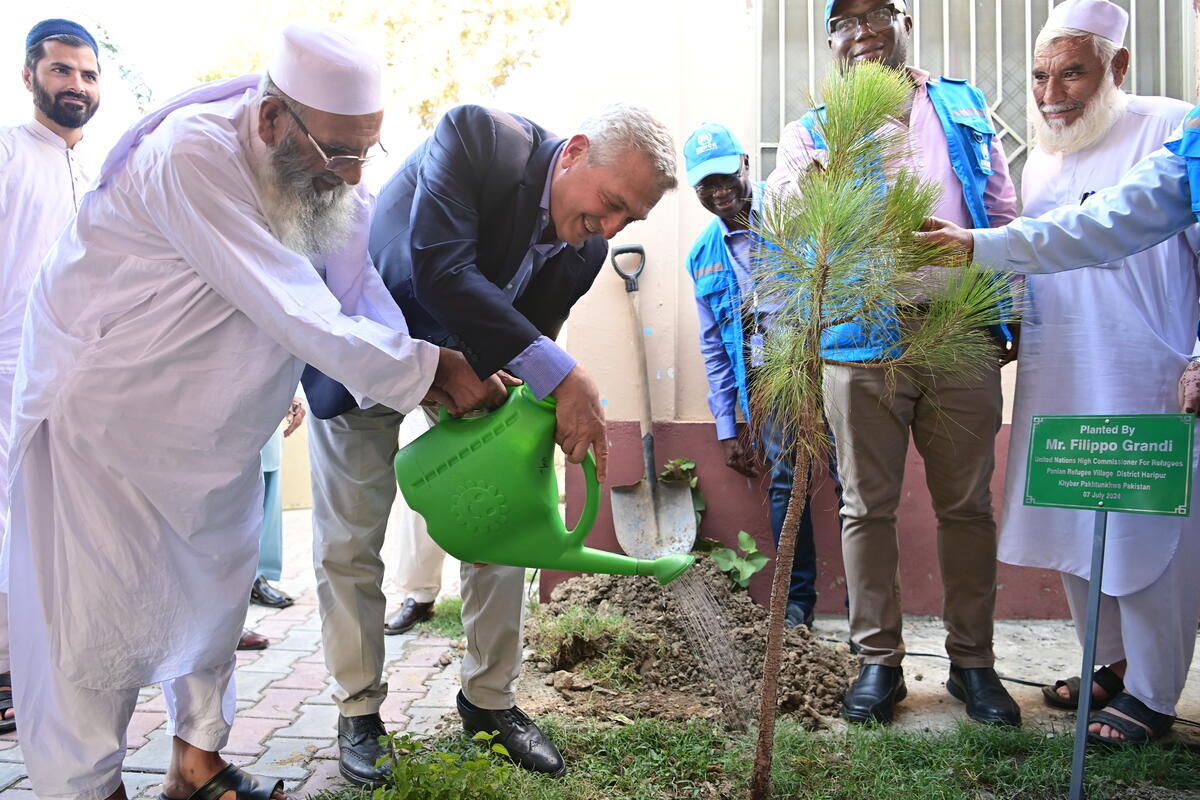Afghanistan Humanitarian Update No. 26
Afghanistan Humanitarian Update No. 26
At a Glance:
- New Arrivals at Chaman, in Southern Pakistan
- Situation on Iranian Border
- Funding
New Arrivals at Pakistan's Chaman Border Point
Afghan families are continuing to cross the Pakistan border to the Killi Faizo staging camp near Chaman in Baluchistan. By mid-afternoon, Friday, 23 new families - around 145 individuals - had entered and been registered in the camp, with a similar number reported to be crossing or about to cross. Around 55 other people, including 7 injured, had also crossed at Chaman but not gone to the camp. In all, there are now some 415 individuals accommodated in the the staging camp, with the number expected to rise above 500 by the end of the day.
On Thursday evening, UNHCR and other aid agency staff continued distributing food and other relief items in Killi Faizo until 10 pm. All the new arrivals have now received enough WFP wheat flour, lentils and vegetable oil to last until Saturday, when a new distribution will take place. They have also received stoves, kerosene, kitchen sets and other relief items, in addition to the tents, plastic sheets and blankets distributed earlier.
The MSF-Holland medical team operating in Killi Faizo has been treating the new arrivals, vaccinating children against measles, and giving them Vitamin A, in addition to treating other ailments. A great many of the children have eye infections, which are also being treated by the MSF team.
Oxfam has installed a 9,000 litre water tank on the site, which is being supplied by tankers, and latrines are being dug in the site.
On Thursday, nine persons who were apparently injured in bombing raids crossed at Chaman and were transferred to Quetta by the Pakistan medical relief agency, EDHI, which maintains two ambulances at the frontier to ferry the sick and injured to Quetta. The injured people who arrived Thursday said they came from a village called Borai, about 25 km south of Kandahar.
An ethnic Uzbek family crossed at Chaman on Thursday, arriving from Sar-i-Pul - a town not far from Mazar-i-Sharif in the far north of Afghanistan. They said that they fled because Northern Alliance forces are actively engaged in forced conscription in the area. Many of the refugees crossing at Chaman over the past few weeks have told UNHCR that they fear being forced to fight for the Taliban. These consistent reports of forced conscription underscore the need for open borders in countries neighbouring Afghanistan.
Another five men who crossed on Thursday and came to Killi Faizo said that 100 or more families from the Mazar-i-Sharif area, including their own, were on the other side in the Afghan town of Spin Boldak. Other new arrivals talk of a total of 400-500 families sheltering in Spin Boldak.
While the Killi Faizo site remains useful as an initial staging post, it is bleak, windswept and dusty and without any possibility of a fixed water supply. UNHCR therefore hopes that permission will soon be given to move new arrivals to the more suitable, and much larger, sites at Roghani and Tor Tangi, around 20 kms south of Chaman.
Iran
Over the past week, UNHCR has continued intensive discussions with the Iranian authorities. UNHCR repeatedly raised its concerns regarding the safety of displaced people and the lack of water in the two camps operated by the Iranian Red Crescent Society inside Afghanistan (Makaki and Mile 46). Many Afghans approaching the border - which remains totally closed - express their fears of forced recruitment by the Taliban, round-ups near the border area, or of being used as human shields by the Taliban. The same concerns relate to the proposed sites at the "zero point" along the border between Iran and Afghanistan. UNHCR has reiterated its hopes that Iran would open the border for fleeing Afghans.
Sporadic reports from NGOs with access to Makaki camp in Taliban-controlled territory inside Afghanistan indicate that shelter at the site is insufficient. There are 444 tents up at the site which could house around 3,000 people. The current camp population is 3,740. Some 30 to 40 families are reportedly staying outside the camp.
UNHCR has also been asking the Iranian government for better access to the border area and their facilitation in setting up telecommunications systems.
A total of 669 Afghans left Iran for Afghanistan via the Dogharoun border crossing on Thursday, bringing the total for the past week to 3,427 persons.
Funding
So far, UNHCR has received $38 million in cash contributions, including new contributions of $5 million from the Netherlands and $107,000 from the Czech Republic. We need $50 million for the first phase of the operation for up to 400,000 possible new arrivals in Pakistan, Iran and elsewhere.








